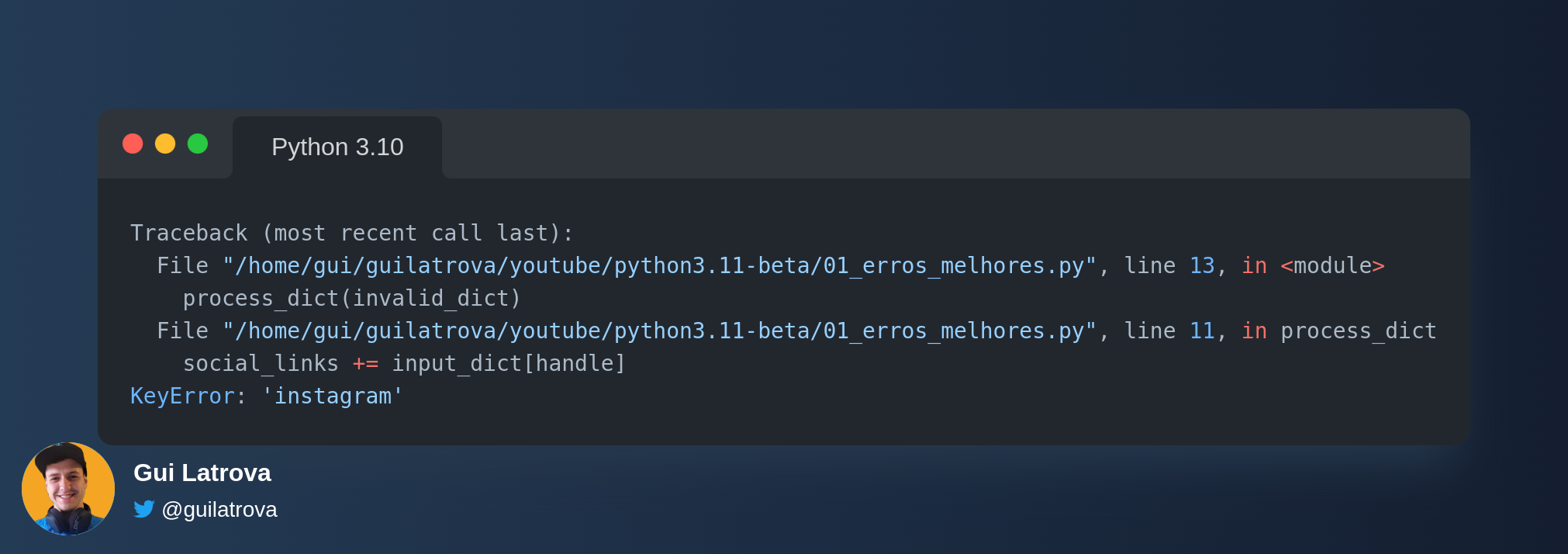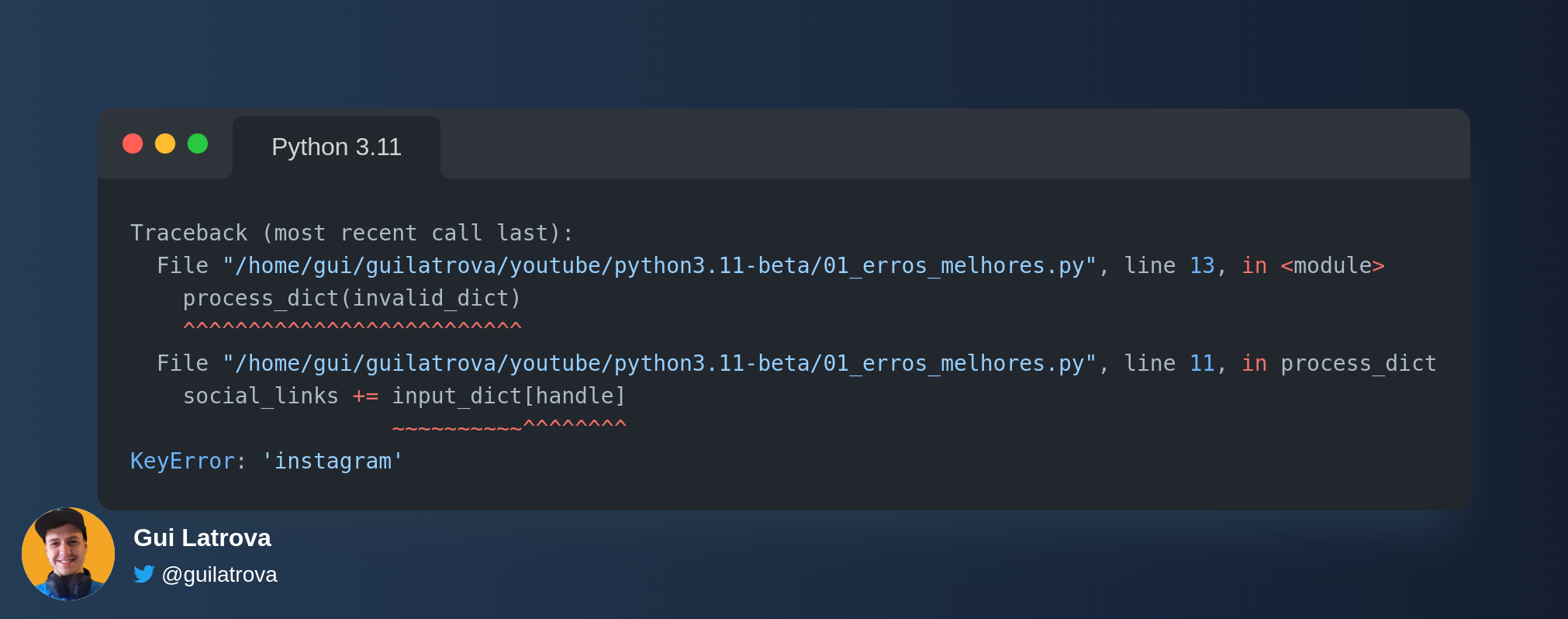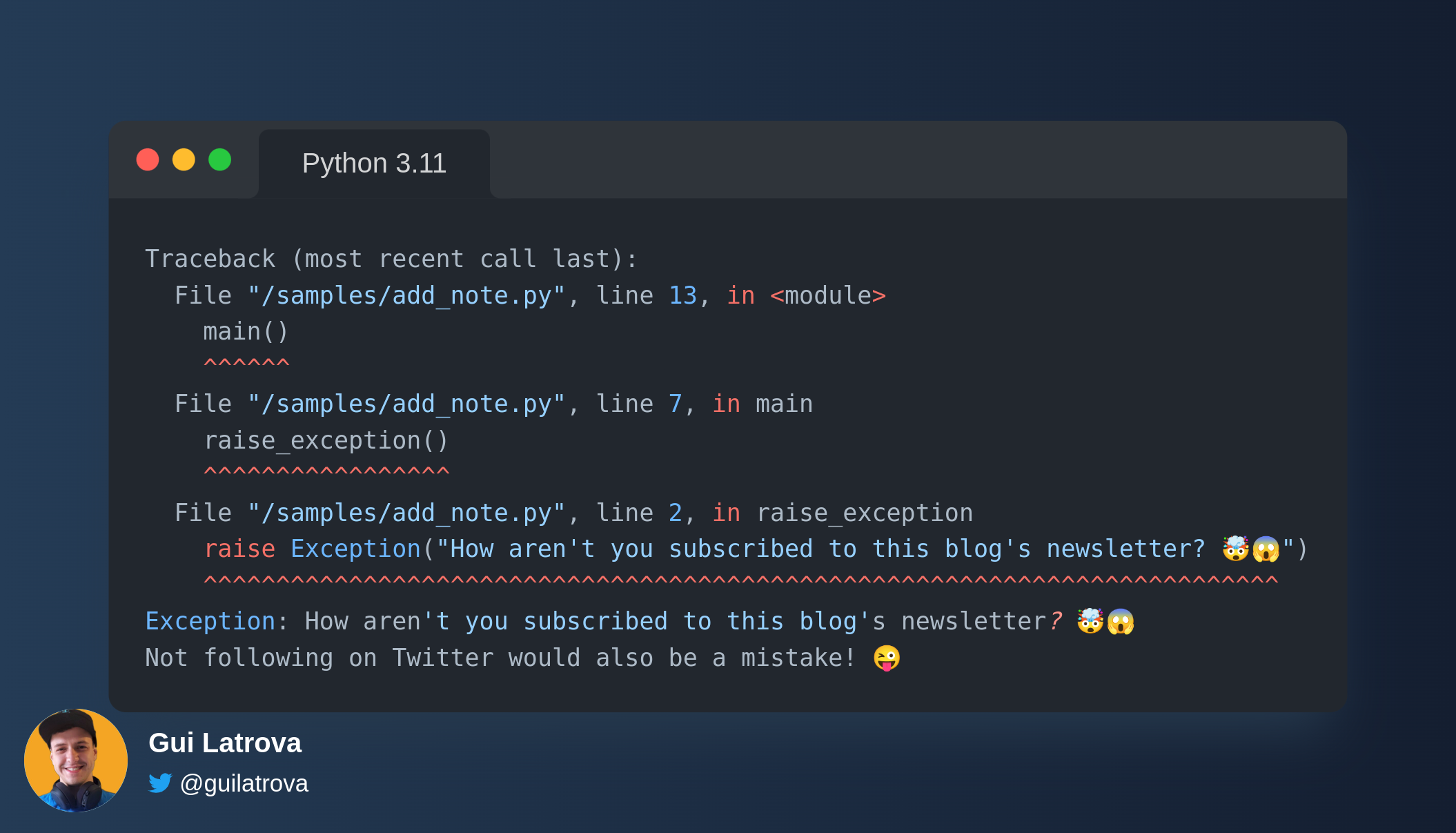Python 3.11 What's New?
Here is a selection of the major changes coming in Python 3.11:
1️⃣ Better Error Handling
Better error messages to easily spot issues in your code.
Consider some code trying to read an invalid key from your dict.
In this case, instagram is an unexistent key that process_dict attempts to read:
invalid_dict = dict(
youtube="Gui Commits",
blog="https://guicommits.com",
twitter="guilatrova",
)
def process_dict(input_dict: dict):
handles = ["youtube", "blog", "twitter", "instagram"]
social_links = []
for handle in handles:
social_links += input_dict[handle]
process_dict(invalid_dict)
If you were running it in Python 3.10, you would see this:

Now in Python 3.11 that's how it looks like:
The characters "~" and "^" point out exactly where the issue is located.

2️⃣ Exception Groups
Now we have an ExceptionGroup that groups many other exceptions inside.
Each exception living inside a group can be individually captured by the except* syntax. See:
def raise_exception_group():
raise ExceptionGroup(
"Description from ExceptionGroup", # Group wrapper
[
ValueError("ValueError"), # First exception in group
TypeError("TypeError") # Second exception in group
]
)
def main():
try:
raise_exception_group()
except* ValueError:
print("Value Error!")
except* TypeError:
print("Type Error!")
main()
Note the code above would print both Value Error! and Type Error!. All except blocks are executed if any exception exists inside the ExceptionGroup.
It can get a bit crazy since you have groups inside groups!
def raise_exception_group():
raise ExceptionGroup(
"Description from ExceptionGroup",
[
ValueError("ValueError"),
TypeError("TypeError"),
ExceptionGroup("Another group", # Second group inside main group
[
Exception("Another error")
]
)
]
)
3️⃣ Exception add_note
Now you can keep enriching your exceptions with further data to add even more context to them!
def raise_exception():
raise Exception("How you aren't subscribed to this blog's newsletter? 🤯😱")
def main():
try:
raise_exception()
except Exception as ex:
ex.add_note("Not following on Twitter would also be a mistake! 😜") # 👈 New method!
raise
main()
So your traceback would display all notes added:

add_note feature giving you some good advice4️⃣ New Type Hints
Self Type
The self type came to resolve a common issue where Python/IDE can't infer the self type.
Consider this working code from previous Python 3.10:
from __future__ import annotations
class Shape:
def set_scale(self, scale: float) -> Self:
self.scale = scale
return self
class Circle(Shape):
def set_radius(self, r: float) -> Self:
self.radius = r
return self
# 🔴 Invalid inferred type!
Circle().set_scale(0.5)
Circle().set_scale(0.5).set_radius(2.7)
My IDE keeps telling me that Circle.set_scale returns Shape, which is not true!

This gets resolved with the new Self type:
from typing import Self # 👈 New typing
class Shape:
def set_scale(self, scale: float) -> Self:
self.scale = scale
return self
class Circle(Shape):
def set_radius(self, r: float) -> Self:
self.radius = r
return self
# 🟢 Correct inferred type!
Circle().set_scale(0.5)
Circle().set_scale(0.5).set_radius(2.7)
LiteralString
Think LiteralString as specific strings typed and expected by the developer.
from typing import LiteralString # 👈 New import
def inferred(s: str) -> bool:
if s == "Did you already signed up for our newsletter?":
print(s) # 👈 Python identifies this as Literal String
return True
else:
print(s) # 👈 This is still any string
return False
def defined(s: LiteralString) -> bool:
print(s)
return True
defined("literal value")
It can be useful to spot and prevent SQL Injection issues.
NotRequired for TypedDict
This feature is already common in TypeScript.
Consider you can define one key's dictionary with either:
- One value as potentially null (already supported)
- One key as potentially missing (new in Python 3.11)
See a few examples of how it would work for a dict with three keys:
blogas required key and required valuetwitteras required key (but optional value)instagramas optional key (but required value)
from typing import NotRequired, TypedDict
class MediaLinks(TypedDict):
blog: str
twitter: str | None # 👈 Key is required, value can be either null or str
instagram: NotRequired[str] # 👈 Key is not required, but if set it should be str
# 🟢 Valid
links_with_instagram: MediaLinks = {"blog": "Gui Commits", "twitter": "@guilatrova", "instagram": "non existent"}
links_without_instagram: MediaLinks = {"blog": "Gui Commits", "twitter": None}
# 🔴 Invalid
links1: MediaLinks = {"blog": "Gui Commits", "twitter": "@guilatrova", "instagram": None}
# 1) 'instagram' can't be None. Mypy output:
# Incompatible types (expression has type "None", TypedDict item "instagram" has type "str")
links2: MediaLinks = {"blog": "Gui Commits"}
# 2) 'twitter' is expected. Mypy output:
# Missing key "twitter" for TypedDict "MediaLinks"
links3: MediaLinks = {"blog": "Gui Commits", "twitter": "@guilatrova", "youtube": "Someday?"}
# 3) 'youtube' isn't expected. Mypy output:
# Extra key "youtube" for TypedDict "MediaLinks"
Remember that Python validates nothing for you.
You must use Mypy to guarantee your typings are correct.
💡 How to use new types before Python 3.11 is released?
Did you know you can start using NotRequired, Self, and LiteralString types already?
You just have to install typing_extensions:
👉 pip install typing_extensions
💁♂️ Impot types from typing_extensions and that's it.
5️⃣ Performance Improvement
Python 3.11 is on average 25% faster than 3.10.
Due to improvements on CPython providing faster startup and faster runtime.
6️⃣ New default module: tomllib
Now Python supports reading toml by default:
import tomllib
toml_str = """
[build]
python-version = "3.11.0"
python-implementation = "CPython"
[tool.poetry.dev-dependencies]
tryceratops = "^1.1.0"
"""
data = tomllib.loads(toml_str)
print(data)
Toml is very common in pyproject.toml files. See this real file from the Tryceratops project.
When releasing your Python code to production🐍
— Gui Latrova (@guilatrova) June 26, 2022
Keep your PRODUCTION and DEV dependencies split!
Use something powerful like Poetry from @SDisPater
• poetry add [PROD_DEPENDENCY]
• poetry add -D [DEV_DEPENDENCY]
(No, you can't rage pip install) pic.twitter.com/T0V0ODjtWc
7️⃣ StrEnum
New type StrEnum with auto() support so you don't have to type
from enum import StrEnum, auto
class Status(StrEnum):
ON_HOLD = auto()
IN_PROGRESS = auto()
ON_REVIEW = auto()
DONE = auto()
print(Status.ON_HOLD) # Output: on_hold
print(Status.ON_HOLD == "on_hold") # Output: True
Now that you know about Python 3.11 changes
If you enjoyed this article did you know you can receive such updates in a shorter/funnier way?
Check out this 👇 thread and consider following @guilatrova 😉
Hey, do you know the major changes from 🐍 Python 3.11 (Beta) so far?
— Gui Latrova (@guilatrova) June 13, 2022
Here's a funny/short thread to keep you updated!
✅ Summary
1. Performance improvement
2. Better error messages
3. Exception groups
4. Exception add_note()
5. New type hints
6. New standard module
1/10 pic.twitter.com/TOg3GPtunN

